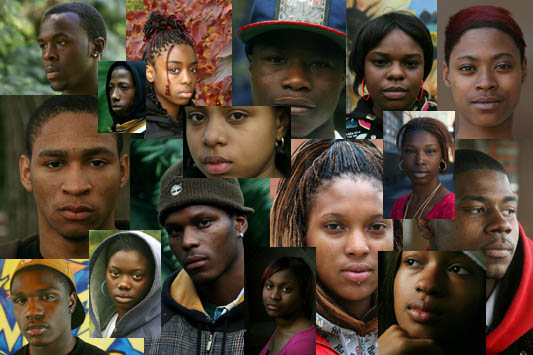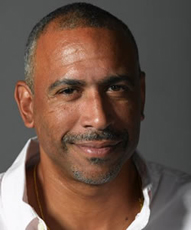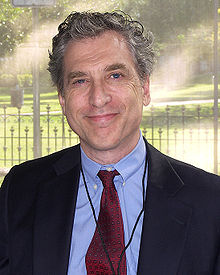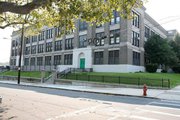Serendip is an independent site partnering with faculty at multiple colleges and universities around the world. Happy exploring!
Notes Towards Day 10 (Thurs, Sept. 29): What Can Schools Do?

I. coursekeeping
naming some more (final test?!)
for Tuesday, we are switching up the original syllabus
(since we had intended to be visiting Parkway then....);
the new reading is Karen Russell's short story,
"St. Lucy's Home for Girls Raised by Wolves"
(which I'll place in our password protected file this weekend);
also please bring back the last two assigned essays
(by Noguera and Traub) for further discussion.
[Russell will be delivering the Balch Lecture on Oct. 19.]
by 5 p.m. on Friday, your 5th paper is due: 3 pp. rethinking your thinking
about the possibility that education can (or can not) "level the playing field."
* extending/testing what you already know experientially....
* the paradox-and-challenge of speaking from your own experience, in order to have it revised
* beginning your paper w/ one of the strong quotes from Noguera's essay
(or Traub's, or hooks, or passages from the on-line forum...)
by 8 p.m. on Sunday, post one thing you hope to learn from Parkway students,
and one thing you think you can bring to the conversation (more on this soon!)

II. We ended class on Thursday in the midst of a "barometer"
about appropriate language in the classroom, and were just
beginning to discuss its relation to access: does "watching
our words" increase access/conversation or limit learning?
what we didn't discuss--and Jody's section did, @ length--
so now we will too!--is appropriate language use
for our talking on-line w/ one another:
/exchange/node/10963#comments
questions about: where does the authority for speaking come from?
what about "speaking for another" (can/should you tell others' stories?)
what assumptions do we make about who is speaking? across class?
thoughts on "how to speak"/what we might (not?) say to one another?
additional cautions, when face-to-face corrections are not possible?
III. Noguera tells us....
"all children ... can learn and grow in positive and productive ways
when provided the opportunity.I have seen education open doors for
those who lacked opportunity, and open the minds of those who could
not imagine alternative ways of being and living" (p. 10).
"while effort is a key ingredient for individual success ... it is not a guarantee ...
academic failure for large numbers of poor and working-class children is inevitable ....
the failure of low-performing schools does not pose a problem for the economy" (p. 13).
"simply providing access to education is [not!] equivalent to providing equal opportunity ...
We continue to delude ourselves with the notion that the United States is a democracy
based on genuine meritocratic principles; a society where social mobility is determined
by individual talent and effort" (p. 15).
IV. what does Traub's account of "what no school can do"
"add to" Noguera's account? in what ways does he challenge it??
"city districts that performed poorly, like those that performed well, scored almost exactly as the socioeconomic status of the children in them would have predicted" (p. 52).
"school, by itself, cannot cure poverty .... there's every reason to think about the limits of school" (p. 54).
are Freire's "limit situations" relevant here??
"there is something disingenuous and self-serving in our professed faith in the omnipotence of school .... School is central to the American myth of self-transcendence .... In the national myth ... schools has the miraculous power of leveling inequalities even as it lifts everyone" (p. 55).
"money does not buy educational equality .... school spending is not correlated with school achievement" (pp. 55-56).
"School reform suffers ... from the problem of the ideal case ....how to make something work on a meaninful scale" [?] (p. 56).
"School is not as powerful an institution as it seems .... Nor is school quite as all-encompassing as it seems .... adolescents pay more attention to peers .... the effects of home and community blotted out almost all those of school .... we now expect the school to provide all the child's human and social capital --an impossibility" (p. 57).
"'schools work for people who have .... human and cultural capital ... to invest in it. And if they don't, then schooling is going to be greatly handicapped" (p. 68).
doesn't everyone have cultural capital???
"the critical task is to change 'the ecology of the lower-calss child in order to increase the probability that he will be more successful in attaining normative skills'" (p. 68).
"if school was only passing on and legitimizing inequality, the only solution was a socialist-style redistribution of income" (p. 68).
"ghetto children need an enveloping environment that is secure and nourshing" (p. 81).
"move families out of the ghetto environment .... spring the children free from the isolation of urban poverty" (pp. 90-91).
problematic conclusions re: middle class "cultural capital"
thread re: how many words people have in their vocabulary = stand in for class issues?
= testing/gateway on multiple levels/treated as independent fact/causal link
V. All good preparation for our going across the hall @ 12:05 
Intro to Parkway West (Jomaira)
- Parkway West is a special admit academy. It is a public school in west Philadelphia.
- Previous Partnership: When Dr. Mccladdie became principal at parkway she asked the Civic Engagement Office if Bryn Mawr wanted to partner. Since then we’ve had BMC students do their praxis there, volunteer, research, and work
- AVID, Student Success Block (blog), College help
Reflection (Jomaira)
- Write for 5 minutes silently about any expectations you have about our visit to Parkway.
- You will not have to share this reflection, it is a private process
Silent Board
- What is it? (Sarah)
- You can write about your assumptions, or others’ assumptions, the media, you can bring readings such as Traub and Nogera etc.
Full group Wrap-around (Sarah)
- Everyone pick out one thing that sticks out from the silent board discussion that you would like to bring to the full group
Wrap Up (Jomaira and Sarah)
- Use Serendip to write one thing you hope to learn from Parkway students and one thing you think you can bring to the conversation
- It’s reciprocal learning!


